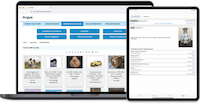How to Determine the Best Funding Match for Your Museum CMS Project

Rachael Cristine Woody
It is time to review exactly what you should look for when considering museum funding opportunities.
This is especially important because a museum Collections Management System (CMS) project is a very specific type of project and not every museum funder will fund this type of undertaking.
In this mini-series we’ve covered how to identify museum CMS projects for funding, what funders look for, and what information to provide for a successful funding application
5 Things to look For
There are five things to look for when assessing a fit with a potential funding opportunity. Each of these items helps to highlight whether the opportunity is suitable for your project. This is different from eligibility. Your museum can be eligible for a funding opportunity; however, it may not ultimately be suitable for the project you have in mind.
- Mission
- Expected Outcome
- Funding Amount
- Funding Duration
- Award History
I recommend having this list handy as you review each funding opportunity so that you can swiftly evaluate funders and move on quickly when it’s not a fit.
Mission
This is the first and easiest assessment to conduct. Nearly every funder will have a mission that dictates what they fund. If your project doesn’t obviously support their mission, then your project will not be competitive and may not even be eligible. This is an important distinction as the museum and its collection may very well be eligible for the grant; however, the project you hope to fund isn’t considered suitable for every museum fund.
Expected Outcome
The next important facet to check is what the funder expects the output to be. For example, there are funders who are only interested in funding exhibits or exhibit elements. While their mission may have been broader, it’s clear from their expected project outcomes that they want an exhibit to be the main output.
Funding Amount
As you shop around for funding opportunities it’s important to consider how much money you need. For example, if your project has an estimated budget of $30,000, then it’s not worth your time to look at funds with a maximum award of $10,000 or less. If you can’t complete your project based on the award amount funders will be confused as to why you’re applying—unless you already have the rest of the funds lined up!
Funding Duration
Second most important compared to fund amount is the funding duration. Museum CMS projects can often take 12-24 months (sometimes longer). With that in mind, you must have a fund that allows you enough time to complete the project successfully. Keep in mind that completing your project on time and before the funder’s deadline is a requirement and can create significant headaches for you and the funder if you don’t.
Award History
Finally, the last important element to review is the funder’s award history. This will demonstrate with great specificity which types of projects they prefer to fund. An award history can help provide additional detail not available in a broad mission statement or vague description of expected outcomes. If these projects are similar to the one you have in mind, then it’s a match! If not, it’s best you move on, even if you’re technically eligible to apply.
Conclusion
This concludes our highlight of museum CMS projects and how to successfully seek funding for this highly technical and specific area of our work. There are many additional resources available for grant funding. Please see our Additional Grant Funding Resources and Additional Reading sections for more support. The Lucidea Grants Workbook & Templates include a template for a CMS project, so make sure to check it out as you begin the quest to fund your next museum CMS project.
Additional Grant Funding Resources
- A Survivor’s Guide to Museum Grant Writing: https://lucidea.com/grant-writing-ebook/
- Webinar Suite: https://lucidea.com/project_category/rachael-woody-webinars/
- Lucidea Grants Directory: https://lucidea.com/grants-directory/
- Lucidea Grants Workbook & Templates: https://lucidea.com/grants-directory/grants-workbook-and-templates/
Additional Reading
- 8 Tips to a Bulletproof Grant Proposal
- How to Calculate an Appropriately Sized Funding Request
- How to Construct a Fundable Museum Digital Project
- How to Find the Best Museum Grant Funding Opportunity
- How to Win Museum Grant Funding for “Boring” Projects
- Museum Grant Pitfalls—Know & Avoid Them
- Top 4 Funding Ideas for Museums
- Where are the Best Places to Find Museum Grants? Part 1
- Where are the Best Places to Find Museum Grants? Part 2
- Who Funds Museum Digital Projects?

Rachael Cristine Woody
Energized by this post? Please join us for the companion webinar How to Construct Museum CMS Projects that Attract Funding, August 28, 2024 at 11 a.m. Pacific, 2 p.m. Eastern. (Can’t make it? Register anyway and we will send you a link to the recording and slides afterwards). Register now.
**Disclaimer: Any in-line promotional text does not imply Lucidea product endorsement by the author of this post.
Never miss another post. Subscribe today!
Similar Posts
Exploring No-Code Digital Storytelling: Hoover’s “Fanning the Flames” Exhibit
Explore no-code digital storytelling with Hoover’s ‘Fanning the Flames’ exhibit. See how interactive tools (Deep Zoom Color Compare & Hot Spot) enhance user engagement and the visual experience.
An Introduction to Scrollytelling for Museums
Discover how museums use scrollytelling and digital storytelling platforms to create immersive narratives. This introduction explores key concepts and approaches to interactive storytelling.
Exploring Self-Determinate Multiple Pathways: An Example of Digital Storytelling
Discover how self-determinate multiple pathways offer flexible interactive storytelling in museum exhibits. Learn from the Tenement Museum’s ‘Your Story Our Story.’
Digital Museum Storytelling Example: A Look at Self-Determinate Linear Pathways
Self-determinate characteristics on a linear pathway go beyond brief sidebar topics and instead offer alternative ways to navigate the linear pathway.







Leave a Comment
Comments are reviewed and must adhere to our comments policy.
0 Comments